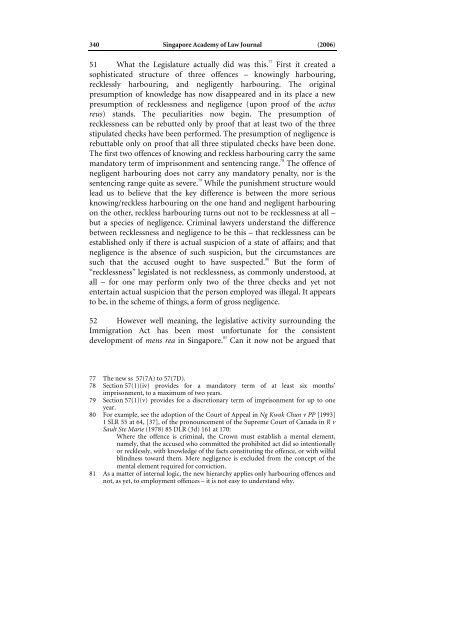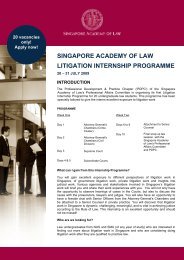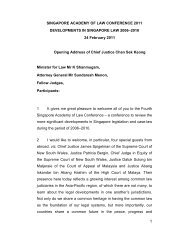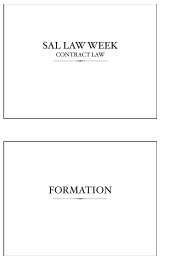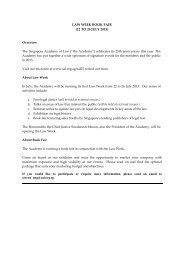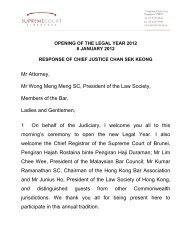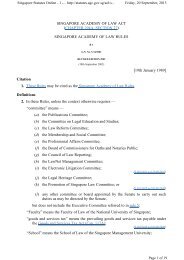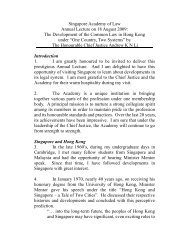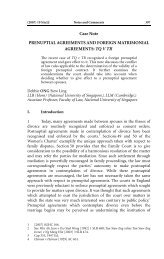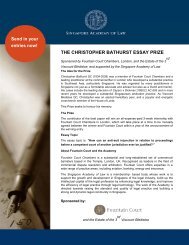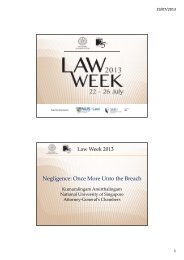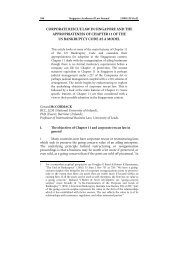2. Managing Mens Rea in Singapore - Singapore Academy of Law
2. Managing Mens Rea in Singapore - Singapore Academy of Law
2. Managing Mens Rea in Singapore - Singapore Academy of Law
You also want an ePaper? Increase the reach of your titles
YUMPU automatically turns print PDFs into web optimized ePapers that Google loves.
340S<strong>in</strong>gapore <strong>Academy</strong> <strong>of</strong> <strong>Law</strong> Journal (2006)51 What the Legislature actually did was this. 77 First it created asophisticated structure <strong>of</strong> three <strong>of</strong>fences – know<strong>in</strong>gly harbour<strong>in</strong>g,recklessly harbour<strong>in</strong>g, and negligently harbour<strong>in</strong>g. The orig<strong>in</strong>alpresumption <strong>of</strong> knowledge has now disappeared and <strong>in</strong> its place a newpresumption <strong>of</strong> recklessness and negligence (upon pro<strong>of</strong> <strong>of</strong> the actusreus) stands. The peculiarities now beg<strong>in</strong>. The presumption <strong>of</strong>recklessness can be rebutted only by pro<strong>of</strong> that at least two <strong>of</strong> the threestipulated checks have been performed. The presumption <strong>of</strong> negligence isrebuttable only on pro<strong>of</strong> that all three stipulated checks have been done.The first two <strong>of</strong>fences <strong>of</strong> know<strong>in</strong>g and reckless harbour<strong>in</strong>g carry the samemandatory term <strong>of</strong> imprisonment and sentenc<strong>in</strong>g range. 78 The <strong>of</strong>fence <strong>of</strong>negligent harbour<strong>in</strong>g does not carry any mandatory penalty, nor is thesentenc<strong>in</strong>g range quite as severe. 79 While the punishment structure wouldlead us to believe that the key difference is between the more seriousknow<strong>in</strong>g/reckless harbour<strong>in</strong>g on the one hand and negligent harbour<strong>in</strong>gon the other, reckless harbour<strong>in</strong>g turns out not to be recklessness at all –but a species <strong>of</strong> negligence. Crim<strong>in</strong>al lawyers understand the differencebetween recklessness and negligence to be this – that recklessness can beestablished only if there is actual suspicion <strong>of</strong> a state <strong>of</strong> affairs; and thatnegligence is the absence <strong>of</strong> such suspicion, but the circumstances aresuch that the accused ought to have suspected. 80But the form <strong>of</strong>“recklessness” legislated is not recklessness, as commonly understood, atall – for one may perform only two <strong>of</strong> the three checks and yet notenterta<strong>in</strong> actual suspicion that the person employed was illegal. It appearsto be, <strong>in</strong> the scheme <strong>of</strong> th<strong>in</strong>gs, a form <strong>of</strong> gross negligence.52 However well mean<strong>in</strong>g, the legislative activity surround<strong>in</strong>g theImmigration Act has been most unfortunate for the consistentdevelopment <strong>of</strong> mens rea <strong>in</strong> S<strong>in</strong>gapore. 81 Can it now not be argued that77 The new ss 57(7A) to 57(7D).78 Section 57(1)(iv) provides for a mandatory term <strong>of</strong> at least six months’imprisonment, to a maximum <strong>of</strong> two years.79 Section 57(1)(v) provides for a discretionary term <strong>of</strong> imprisonment for up to oneyear.80 For example, see the adoption <strong>of</strong> the Court <strong>of</strong> Appeal <strong>in</strong> Ng Kwok Chun v PP [1993]1 SLR 55 at 64, [37], <strong>of</strong> the pronouncement <strong>of</strong> the Supreme Court <strong>of</strong> Canada <strong>in</strong> R vSault Ste Marie (1978) 85 DLR (3d) 161 at 170:Where the <strong>of</strong>fence is crim<strong>in</strong>al, the Crown must establish a mental element,namely, that the accused who committed the prohibited act did so <strong>in</strong>tentionallyor recklessly, with knowledge <strong>of</strong> the facts constitut<strong>in</strong>g the <strong>of</strong>fence, or with wilfulbl<strong>in</strong>dness toward them. Mere negligence is excluded from the concept <strong>of</strong> themental element required for conviction.81 As a matter <strong>of</strong> <strong>in</strong>ternal logic, the new hierarchy applies only harbour<strong>in</strong>g <strong>of</strong>fences andnot, as yet, to employment <strong>of</strong>fences – it is not easy to understand why.


